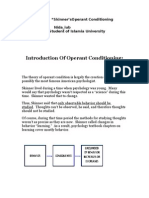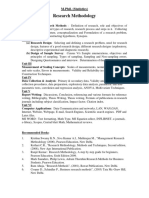Famous Psychologists
Famous Psychologists
Uploaded by
Elizabeth BloodcountessCopyright:
Available Formats
Famous Psychologists
Famous Psychologists
Uploaded by
Elizabeth BloodcountessCopyright
Available Formats
Share this document
Did you find this document useful?
Is this content inappropriate?
Copyright:
Available Formats
Famous Psychologists
Famous Psychologists
Uploaded by
Elizabeth BloodcountessCopyright:
Available Formats
Famous Psychologists
Allport, Gordon: Gordon Allport's theory of personality development is one of the first humanistic theories. Beck, Aaron: Aaron Beck is known as the father of cognitive therapy and inventor of the widely used Beck Depression Inventory (BDI), Beck Hopelessness Scale, and Beck Anxiety Inventory (BAI). Binet, Alfred: Alfred Binet (July 8, 1857 - October 18, 1911) was a French psychologist and developer of the first usable intelligence test, the basis of today's IQ test. Chomsky, Noam: Noam Chomsky is credited with the creation of the theory of generative grammar, considered to be one of the most significant contributions to the field of theoretical linguistics made in the 20th century. Ellis, Albert: Albert Ellis is an American cognitive behavioral therapist who developed Rational Emotive Behavioral Therapy (REBT). Erikson, Erik: Erik Homburger Erikson was a developmental psychologist and psychoanalyst known for his theory on social development of human beings, and for coining the phrase identity crisis. Erickson, Milton: Milton Erickson is considered the father of modern hypnotherapy. The therapy he engendered, Ericksonian hypnotherapy, is one of the fastest growing and influential branches of hypnotherapy today. His methods inspired NLP (Neuro-Linguistic Programming). Freud, Sigmund: Sigmund Freud is the father of psychoanalysis, and is generally recognized as one of the most influential and authoritative thinkers of the twentieth century. Fromm, Erich: Erich Fromm was an internationally renowned social psychologist and humanistic philosopher. Glasser, William: William Glasser is the developer of Reality Therapy and Choice Theory. He is notable for having developed a cause and effect theory that explains human behavior. Harlow, Harry: Harry Harlow was a psychologist best known for his studies on affection and development using rhesus monkeys and surrogate wire or terrycloth mothers. Jung, Carl: Carl Jung was a Swiss psychiatrist and founder of analytical psychology. Kinsey, Alfred: Alfred Kinsey's research on human sexuality profoundly influenced social and cultural values in the United States and many other countries. Lang, R. D.: R.D. Lang , was a Psychoanalyst, Social Phenomenologist, Radical Psychiatrist, and Existential Philosopher. He wrote extensively on mental illness and particularly the experience of psychosis. Leary, Timothy: Timothy Leary was a writer, psychologist, and advocate of psychedelic drug research and use. He coined and popularized the catch phrase "Turn on, tune in, drop out." Lewin, Kurt: Kurt Lewin became one of the pioneers of social psychology. Often called "the father of social psychology," and one of the first researchers to study group dynamics and organizational development. Perls, Fritz: Fritz Perls is the founder of Gestalt therapy. Fritz Perls is also know for his work with dreams. Maslow, Abraham: Abraham Masolw one of the founders of humanistic psychology and is often best recognized for developing the theory of human motivation now known as Maslow's Hierarchy of Needs. May, Rollo: Rollo May was an existential psychologist and has often been referred to as "the father of existential psychotherapy."
Piaget, Jean: Jean Piaget spent much of his professional life listening to children, watching children and in the area of developmental psychology. Pavlov, Ivan: Ivan Pavlov is widely known for first describing the phenomenon now known as classical conditioning in his experiments with dogs. Rogers, Carl: Carl Rogers was instrumental in the development of non-directive psychotherapy, which he initially termed Client-centered therapy and he is known as the father of client-centered therapy. Satir, Virginia: Virginia Satir was a noted American author and psychotherapist, known especially for her approach to family therapy. Virginia Satir is referred to as "The Mother of Family System Therapy" Skinner, B.F.: B. F. Skinner was one of the most influential of Americanpsychologists. A behaviorist, he developed the theory of operant conditioning. Wolpe, Joseph: Joseph Wolpe is best known for developing theories and experiments about what is now called systematic desensitization and assertiveness training.
Throughout psychology's relatively brief history, there have been many famous psychologists who have left their mark both on psychology and on the world at large. While some of these individuals do not necessarily fit today's definition of a 'psychologist', a term which indicates a doctoral-level degree in psychology, their influence on psychology is without question. Learn more about psychologists by browsing through this list of some of the most famous thinkers in psychology history. Alfred Adler
Public Domain
Alfred Adler is known as one of the most influential thinkers in psychology. While he was initially a member of the Vienna Psychoanalytic Society, Adler eventually departed from Freud's theories and developed his own perspective, which he called Individual Psychology. He had a strong influence on a number of other eminent psychologists, including Carl Rogers, Abraham Maslow and Karen Horney. Mary Ainsworth Mary Ainsworth was a psychologist best known for her research on attachment theory and the development of the "strange situation" assessment. Her work played an important role in our understanding of child development and has influenced other fields including education. Gordon Allport Gordon Allport was a psychologist perhaps best-known as one of the founding figures of personality psychology. He also developed a trait theory of personality that described three broad categories of personality traits. Solomon Asch Solomon Asch was a pioneering social psychologist. His famous conformity experimentsdemonstrated that people will claim that something is correct when it obviously is not due to social pressure from peers. Asch also had an important influence on psychologist Stanley Milgram, whose own obedience experiments were inspired by Asch's work. Albert Bandura Albert Bandura is a psychologist known for his famous "Bobo doll" experiment as well as his concepts of self-efficacy and social learning. Banduras work is considered part of the cognitive revolution in psychology that began in the late 1960s. His theories have had tremendous impact on personality psychology, cognitive psychology, education, and therapy.
Alfred Binet
Public Domain
Alfred Binet was a French psychologist that is famous for his development of the first widely used intelligence test. He is often described as one of the most influential thinkers in psychology history and his original test still serves as the basis for modern tests of intelligence. Mary Whiton Calkins Mary Whiton Calkins was the first female president of the American Psychological Association. She studied had Harvard with famous teachers including William James and Hugo Munsterberg. Despite completing all of the requirements for a doctorate degree in psychology, Harvard refused to grant her degree simply because she was a woman. James McKeen Cattell
Image courtesy Library of Congress
James McKeen Cattell was the first U.S. psychology professor. He is an important figure in psychology thanks to his work in intelligence, his use of quantitative methods and his focus on establishing psychology as a legitimate science. Raymond Cattell
Image from Wikimedia Commons
Raymond Cattell was a pioneering psychology who is perhaps best known for his use of multivariate analysis and his 16-factor personality model. Mihaly Csikszentmihalyi He's an important contemporary psychologist, but one of your first questions is probably "How do you pronounce his name?" (It's me-HIGH chick-sent-me-HIGH-ee, by the way.) Learn more about his work and contributions to modern psychology in this brief biography.
John Dewey
Image courtesy Wikimedia Commons
John Dewey was an American psychologist, philosopher, writer and educational theorist. His work had a vital influence on psychology, education and philosophy and he is often considered one of the greatest thinkers of the 20th-century. His emphasis on progressive education has contributed greatly to the use of experimentation rather than an authoritarian approach to knowledge. Erik Erikson
Public Domain
Erik Erikson's well-known stage theory of psychosocial developmenthelped generate interest and inspire research on human development through the lifespan. An ego psychologist who studied with Anna Freud, Erikson expanded psychoanalytic theory by exploring development throughout the life, including events of childhood, adulthood and old age. Hans Eysenck
Image from the Wikimedia Commons / Sirswindon at en.wikipedia
Hans Eyesenck was a very prolific psychologist, publishing more than 75 books and 1600 journal articles. Prior to his death in 1997, he was the living psychologist most frequently cited in scientific books and journal articles. He was also a very controversial figure, and his outspoken views of subjects ranging from psychotherapy to intelligence made him subject of criticism. Leon Festinger Leon Festinger was an influential social psychologist who is well-known for his theory ofcognitive dissonance as well as his social comparison theory. Anna Freud Anna Freud began her career influenced by the theories of her father, Sigmund Freud. Far from living in her father's shadow, Anna Freud made important contributions of her own to psychology. She founded child psychoanalysis and summarized the ego's defense mechanisms in her book The Ego and the Mechanisms of Defense (1936).
Sigmund Freud
Public Domain
Sigmund Freud may be one of the best known figures in history, but he is also one of the most controversial. He was the founder of the school of psychology known as psychoanalysis. The legacy of his life and work provokes both impassioned acclaim from his supporters and disdain from his detractors. While some view him as a cultural icon and others see him as a pseudo-scientific charlatan, there is no question that Freud left an indelible mark on psychology as well as other disciplines. G. Stanley Hall
G. Stanley Hall (front center). Public Domain.
G. Stanley Hall founded the first American psychology lab at John Hopkins University and also became the first president of the American Psychological Association (APA) in 1892. He had a huge influence on the development of early psychology in the United States and many of his students went on to become eminent psychologists, including Lewis Terman, John Dewey and James McKeen Cattell. Karen Horney
Public Domain
Karen Horney was a prominent psychoanalyst best-known for hertheories of neurosis, feminine psychology, and and self psychology. While Horney was a neo-Freudian, she also challenged many of Sigmund Freud's theories about female psychology. For example, Horney countered Freud's assertion that women experience "penis envy" by suggesting that men feel "womb envy" because they are unable to bear children. William James
Public Domain
Psychologist and philosopher William James is often referred to as the father of American psychology. His 1200-page text, The Principles of Psychology, became a classic on the subject and his teachings and writings helped establish psychology as a science. James also contributed to functionalism, pragmatism and influenced many students of psychology during his 35-year teaching career.
Carl Jung
Public Domain
Carl Jung was a Swiss psychiatrist who founded the school of thought known as analytical psychology. He is known for his concepts of archetypes and the collective unconscious. Kurt Lewin
Public Domain
Psychologist Kurt Lewin is often referred to as the father of modern social psychology. His pioneering theories argued that behavior is caused by both personal characteristics and the environment. Lewin's emphasis on scientific methodology and systematic study had an enormous impact on future research in social psychology. He is also well-known for his styles of leadership. Abraham Maslow
Image from Wikimedia Commons
Abraham Maslow is perhaps best known as the founder of humanistic psychology. His famous hierarchy of needs and concepts of selfactualization and peak experiences remain influential to this day, especially in the field of positive psychology. Hugo Mnsterberg
Public Domain
Hugo Munsterberg was a German psychologist who is known for his contributions to applied psychology. Despite the fact that his work still has an influence on many areas of modern psychology, his legacy was largely forgotten for many years. Learn more about Hugo Munsterberg's life, career and theories in this brief biography.
Ivan Pavlov
Public Domain
Ivan Pavlov was a Russian physiologist whose research on conditioned reflexes influenced the rise of behaviorism in psychology. Pavlov's experimental methods helped move psychology away from introspection and subjective assessments to objective measurement of behavior. While he was not technically a "psychologist," his contributions to the field of psychology and his discovery of classical conditioning makes him one of psychology's greatest pioneers. Jean Piaget
Roland Zumbhl
Jean Piaget was a psychologist best-known for his stage theory ofcognitive development. He was one of the first thinkers to suggest that children think differently than adults, a concept that was considered revolutionary at the time. Carl Rogers
Public Domain
Carl Rogers was one of the most influential psychologists of the 20th century. In addition to contributing to the development of humanistic psychology, his work had a dramatic influence on psychology, therapy and education. Martin Seligman Martin Seligman is often described as the father of contemporary positive psychology. He served as President of the American Psychological Association in 1998, and in a survey of the most influential psychologists of the 20th century, Seligman was ranked as the 13th most frequently cited psychologist in introductory psychology textbooks. B. F. Skinner
Public Domain
B. F. Skinners research on operant conditioning (also known as instrumental conditioning) made him one of the leaders of behaviorism, but his theories and research also made him a target for controversy. Skinner's work remains influential today, especially in the field of behavioral therapy where behavior modification and intervention are used to change problem behaviors or reinforce new ones.
Edward Thorndike Edward Thorndike was a pioneering American psychologist perhaps best known for the law of effect. While he was a very successful student, he initially disliked his first psychology course. His interest in psychology grew after reading the classic book The Principles of Psychology by William James. Today, he is often referred to as the father of moderneducational psychology. Learn more about his personal life, teaching career and psychology research in this biography of Edward Thorndike. Lev Vygotsky
Image courtesy Wikimedia Commons
Lev Vygotsky is often described as a seminal psychologist, since most of his ideas were not discovered by many people until well after his death. He is best known for his sociocultural theory and his concepts of the zone of proximal development and guided practice. John B. Watson John B. Watson is often referred to as the "father of behaviorism." His view that psychology was the science of observable behaviors had a strong influence, and the behavioral perspective rose to dominate the field during the first half of the twentieth century. Watson was one of the strongest advocates for behaviorism, suggesting that psychology should be objective and focus on the study of human behaviors. Wilhelm Wundt
Public Domain
Wilhelm Wundt is best-known for establishing the very first psychology lab in Leipzig, Germany. His work help establish psychology as its own discipline separate from philosophy and physiology. Philip Zimbardo
Photo by shammer86 at http://www.flickr.com/photos/shammer86/440278300/
Philip Zimbardo is an influential psychologist who conducted a famous experiment during the early 1970s known as the Stanford Prison Experiment. He is also widely recognized for his research on shyness, cult behavior and heroism.
Most Influential 1. B. F. Skinner
Public Domain
In the 2002 study ranking the 99 most eminent psychologists of the 20th century, B.F. Skinner topped the list. Skinner's staunch behaviorism made him a dominating force in psychology and therapy techniques based on his theories are still used extensively today, including behavior modification and token economies. 2. Sigmund Freud
Public Domain
When people think of psychology, many tend to think of Freud. His work supported the belief that not all mental illnesses have physiological causes and he also offered evidence that cultural differences have an impact on psychology and behavior. His work and writings contributed to our understanding of personality, clinical psychology, human development, and abnormal psychology. 3. Albert Bandura Bandura's work is considered part of the cognitive revolution in psychology that began in the late 1960s. His social learning theory stressed the importance of observational learning, imitation, and modeling. "Learning would be exceedingly laborious, not to mention hazardous, if people had to rely solely on the effects of their own actions to inform them what to do," Bandura explained in his 1977 book Social Learning Theory. 4. Jean Piaget
Roland Zumbhl
Jean Piaget's work had a profound influence on psychology, especially our understanding children's intellectual development. His research contributed to the growth of developmental psychology, cognitive psychology, genetic epistemology, and education reform. Albert Einstein once described Piaget's observations on children's intellectual growth and thought processes as a discovery "so simple that only a genius could have thought of it."
5. Carl Rogers
Public Domain
Carl Rogers placed emphasis on human potential, which had an enormous influence on both psychology and education. He became one of the major humanist thinkers and an eponymous influence in therapy with his "Rogerian therapy." As described by his daughter Natalie Rogers, he was "a model for compassion and democratic ideals in his own life, and in his work as an educator, writer, and therapist." 6. William James
Public Domain
Psychologist and philosopher William James is often referred to as the father of American psychology. His 1200-page text, The Principles of Psychology, became a classic on the subject and his teachings and writings helped establish psychology as a science. In addition, James contributed to functionalism, pragmatism, and influenced many students of psychology during his 35-year teaching career. 7. Erik Erikson
Public Domain
Erik Erikson's stage theory of psychosocial development helped create interest and research on human development through the lifespan. An ego psychologist who studied with Anna Freud, Erikson expanded psychoanalytic theory by exploring development throughout the life, including events of childhood, adulthood, and old age.
8. Ivan Pavlov
Public Domain
Ivan Pavlov was a Russian physiologist whose research on conditioned reflexes influenced the rise of behaviorism in psychology. Pavlov's experimental methods helped move psychology away from introspection and subjective assessments to objective measurement of behavior.
9. Kurt Lewin
Public Domain
Lewin is known as the father of modern social psychology because of his pioneering work that utilized scientific methods and experimentation to look as social behavior. Lewin was a seminal theorist whose enduring impact on psychology makes him one of the preeminent psychologists of the 20th-century. 10. Reader's Choice Following the examples of Eugene Garfield's 1977 ranking list and Haggbloom's 2002 ranking, the final position on this list has been left blank in order to allow "the reader's best case for a psychologist who should have made the list" (Haggbloom, 2002).
Psychologists and Their Contributions ( http://www.ApPsychology.net ) 1. Frances Galton: Maintained that personality and ability depend almost entirely on genetic inheritance(human traits are inherited) 2. Charles Darwin: Theory of evolution, survival of the fittest-origin of the species 3. William Wundt: introspection-psychology became the scientific study of conscious experience (rather than science) 4. John Watson: Founder of behaviorism- Did the study of generalization 5. Little Albert: Watsons study on the generalization of fear. Conditioning subject to be afraid 6. Alfred Adler: Neo Freudian, believed that childhood social not sexual tensions are crucial for personality formation 7. Carl Jung: People had conscious and unconscious awareness-two layers of unconscious archetypespersonal/collective 8. Gordon Allport: Three levels of traits: 1. Cardinal trait-it is the dominant trait that characterizes your life; 2.Central trait-one common to all people; 3. Secondary trait- it surfaces in some situations and not in others 9. Albert Ellis: Rational Emotive Therapy-focuses on altering clients patterns of irrational thinking to reduce maladaptive behaviour and emotions 10. Albert Maslow: Hierarchy of needs-Needs at the lower level dominate an individuals motivation as long as they are unsatisfied. Once these needs are adequately met, the higher needs occupy the individuals attention. 11. Carl Rogers: Humanistic psychology-the theory that emphasizes the unique quality of humans especially their freedom and potential for personal growth. 12. B.F. Skinner: Operant conditioning-techniques to manipulate the consequences of an organisms behaviour in order to observe the effects of subsequent behaviour. Also Skinner Box. 13. Ivan Pavlov: Classical conditioning-An unconditional stimulus naturally elicits a reflexive behaviour called an unconditional response. But with repeated pairings with a neutral stimulus, the neutral stimulus will elicit the response. Dog Salivation etc. 14. Noam Chomsky: Disagreed with Skinner and said there an infinite number of sentences in a language. He said that humans have an inborn native ability to develop language. 15. Jean Piaget: Four-stage theory of cognitive development. 1. Sensorimotor, 2. preoperational, 3. concrete
operational, 4. formal operational He said that two basic processes work in tandem to achieve cognitive growth-assimilation & accommodation 16. Erik Erikson: People evolve through 8 stages over the life span. Each stage marked by psychological crisis that involves confronting who am I 17. Lawrence Kohlberg: His theory states there are 3 levels of moral reasoning and each level can be divided into 2 stages. 1. Pre-conventional, 2. conventional, 3.post-conventional. His theory focuses on moral reasoning rather than overt behaviour. 18. Carol Gilligan: She maintained that Kolbergs work was developed only observing boys and overlooked potential differences between the habitual moral judgments of men and women 19. James Lange Theory: It asserts that the perception of emotion is our awareness of our physiological response to emotion arousing stimuli. e.g. sight of coming car-pounding heart-fear 20. Cannon-Bard Theory: An emotion-arousing stimulus triggers cognitive body responses simultaneously. E.g. arousal and emotion are simultaneous 21. Phineas Gage: First person to have a frontal lobotomy. Gave psychology information on part of the brain that is involved with emotions reasoning etc. 22. Hans Eysenck: Personality is determined to a large extent by genes. He used the terms Extroversion/Introversion 23. S. Schacter: To experience emotions 1. must be physically aroused 2. must cognitively label arousal (know the emotion before you experience it)
24. Mary Cover Jones: Systemic desensitization 25. Benjamin Whorf: His hypothesis is that language determines the way we think 26. Robert Sternberg: Triarchic theory of intelligence. 1. academic problem-solving intelligence 2. practical intelligence 3. creative intelligence 27. Howard Gardner: Theory of multiple intelligences 28. Albert Bandura: Observational Learning-it allows you to profit immediately from the mistakes and successes of others. His experiment had adult models punching BoBo dolls and then observed children whom watched this exhibit many of the same behaviours. 29. E.L. Thorndike: Law of effect-(the relationship between behaviour and its consequences) the principle that behaviour followed by favourable consequences becomes more likely. Behaviour followed by less likely
consequences becomes less likely 30. Alfred Binet: general I.Q. tests. A Frenchman designed a test that would identify slow learners in need of remedial help. It was not that valuable in America as it was too culture bound. 31. Lewis Term an: Revised Binets I.Q. test and established norms for American children 32. David Weschler: he established an intelligence test especially for adults. It became the WAIS, Weschler Intelligence Test for Adults. 33. Charles Spearman: He found that specific mental talents were highly correlated. He concluded that all cognitive abilities showed a common core which he labeled g, for general ability 34. H. Rorschach: He developed one of the first projective tests, the Inkblot test. The subject reads the inkblots and projects to the observer aspects of their personality. It uses 10 standarized inkblots 35. Philip Zimbardo: Conducted the famous Stanford Prison experiment. It was conducted to study the power of social roles to influence peoples behaviour. It proved peoples behaviour depends to a large extent on the roles they are asked to play. 36. David Rosenhan: He with a number of people from different walks of life conducted a hospital experiment to test the diagnosis of hospitals make on new patients. He also wanted to see the impact on behaviour on being a patient. He proved that once you are diagnosed with a disorder, your care would not be very good in a mental hospital setting. 37. Simon Asch: Study on conformity. His experiment had a subject unaware of his situation, test to see if he would conform if all the members of the group gave an incorrect answer. 38. Stanley Milgram: Conducted a study on obedience when he had a subject shock a patient to the extent that they would be seriously injuring the patient. 39. Kurt Lewin: A German refugee who escaped Nazi oppression. He designed an experiment to investigate the effects of different leadership styles on group functions. He wanted to find out if people were more productive under 3 different leadership styles. 1. autocratic 2. laizssez-faire 3. democratic. This is the study when he had the children do activities under the 3 conditions. The democratic style proved to be the most productive as was expected. 40. Harry Harlow: Studied theory of attachment in infant Rhesus monkeys. 41. William Sheldon: The theory that linked personality to physique on the grounds that both are governed by genetic endowment. Endomorphic- (large), Mesomorphic- (average), Ectomorphic- (skinny) 42. Sigmund Freud: Psychoanalytical theory that focuses on the unconscious- Id-Ego-Superego
43. Karen Horney: Critical of Freuds theories. She said that personality is continually mold by current fears and impulses, rather than being determined solely by childhood experiences and instincts. 44. Mary Cover Jones: Systemic desensitization. She maintained that fear could be unlearned. We could teach Little Albert, to be unafraid of rabbits. 45. Martin Seligman: Learned helplessness is the giving up reaction, the quitting response that follows from the belief that whatever you do does not matter. The woman in Schindlers List who explains to Schindler that no matter what she does she receives the same punishment 46. H. Ebbinghas: The first to conduct scientific studies on forgetting: first, a rapid loss followed by a gradual declining rate of loss. 47. Hubel/Wisel: Did a study of the activities of neurons in the visual cortex. 48. Young-Helmholz-Trichromatic theory of colour vision: said 3 types of colour receptors in the eye 49. Clark Hull-Drive theory: It maintains that the goal of all motivated behaviour is the reduction or alleviation of a drive state. It is the mechanism through which reinforcement operates. 50. Walter B. Cannon: He believed that that gastric activity in as empty stomach was the sole basis for hunger. Did an experiment by inserting balloon in subjects stomach 51. Brocas Area: The left frontal lobe that directs muscle movement involved in speech. He did his studies with a subject who could only speak one word, Tan. The person damaged in this area has speech that makes sense but has difficulty speaking 52. Wernickes Area: An area of the left temporal lobe involved language understanding. The person damaged in this area uses correct words but they do not make sense. 53. Ernst Weber: He pioneered the first study on JND- (just noticeable difference). It became Webers law; the JND between stimuli is a constant fraction of the intensity of the standard stimulus. E.g. the bigger or more intense the standard stimulus, the larger the increment needed to get a noticeable difference. Room with 10 candles vs. one with 30 candles. 54. Fechners law: It states that the magnitude of a sensory experience is proportional to the number of JNDs that the stimulus causing the experiences above absolute threshold. 55. Kubler-Ross: Her theory proposes that the terminally ill pass through a sequence of 5 stages. 1. denial, 2. anger/resentment, 3. bargaining with God, 4. depression, 5. Acceptance 56. Robert Zajonc: Mere exposure effect It is possible to have preferences without inferences and to feel without knowing why.
57. Henry Murray: he stated that the need to achieve varied in strength in different people and influenced their tendency to approach success and evaluate their own performances. He devised the TAT-Thematic Appreciation Test along with Christiana D. Morgan. Subjects are asked to generate stories in response to ambiguous pictures. e.g. the person resting against the park bench. 58. David McClelland: He devised a way to measure H. Murrays theory the need to achieve that varied in strength in different people and influenced their tendency to approach success and evaluate their own performances. He is credited with developing the scoring system for the TAT's use in assessing achievement motivation, not for the TAT itself. 59. Paul Ekman: The theory that facial expressions are universal
You might also like
- A History of Modern Psychology 11th Edition - Test BankDocument53 pagesA History of Modern Psychology 11th Edition - Test BankvaanironeNo ratings yet
- List of Psychologist and Their WorksDocument2 pagesList of Psychologist and Their WorksSimon Mauma EfangeNo ratings yet
- Thinking Critically About Psychology and Research Methods: Dr. Daniella MokhtarDocument78 pagesThinking Critically About Psychology and Research Methods: Dr. Daniella Mokhtar038 Suri HananNo ratings yet
- ReliabilityDocument9 pagesReliabilityNova Marie PedrosaNo ratings yet
- Subject: Theories of Personality Focus: Behavioral/ Social Learning Theories By: Benny S. Soliman, Rgc.,Lpt.,Rpm. Learning ObjectivesDocument13 pagesSubject: Theories of Personality Focus: Behavioral/ Social Learning Theories By: Benny S. Soliman, Rgc.,Lpt.,Rpm. Learning ObjectivesLeny Jas100% (1)
- Spring 2017 Chapter 1Document45 pagesSpring 2017 Chapter 1Fallon WallNo ratings yet
- 20 Famous Psychologist From HistoryDocument16 pages20 Famous Psychologist From HistoryJeffelyn MojarNo ratings yet
- Intro To PsychologyDocument3 pagesIntro To PsychologyAndrea CampbellNo ratings yet
- Chapter 1Document18 pagesChapter 1cuyyah100% (1)
- Edu 421 Fundamentals of Guidance and CounselingDocument96 pagesEdu 421 Fundamentals of Guidance and Counselingmeght83% (6)
- Guidance Curriculum and SyllabiDocument89 pagesGuidance Curriculum and SyllabirozesarenasNo ratings yet
- Theories of LearningDocument25 pagesTheories of LearningSheherbano TariqNo ratings yet
- Developmental Psychology C8546 UG 2013-2014Document8 pagesDevelopmental Psychology C8546 UG 2013-2014ashworthcee0% (1)
- Behaviorism by Skinner and OthersDocument6 pagesBehaviorism by Skinner and OthersAnonymous On831wJKlsNo ratings yet
- Knowledge and CurriculumDocument16 pagesKnowledge and CurriculumSrinithya NNo ratings yet
- Learning and Behaviour ModificationDocument5 pagesLearning and Behaviour ModificationMohammed Abu ShaibuNo ratings yet
- Clinical Psychology 1Document8 pagesClinical Psychology 1Rineeta BanerjeeNo ratings yet
- Psychodynamic Theories of PersonalityDocument41 pagesPsychodynamic Theories of PersonalityJavier Tracy AnneNo ratings yet
- Operant ConditioningDocument11 pagesOperant Conditioningnida_iub0% (1)
- Theories of LearningDocument25 pagesTheories of LearningShi R. LeeNo ratings yet
- Developmental Psychology Essay 22009Document10 pagesDevelopmental Psychology Essay 22009brainistheweapon100% (1)
- Physiological Psychology Lecture Notes: Nervous System DamageDocument3 pagesPhysiological Psychology Lecture Notes: Nervous System DamageGeneric_PersonaNo ratings yet
- Psychology ExperimentsDocument15 pagesPsychology ExperimentsmeghtNo ratings yet
- Lifespan Development Developmental PsychologyDocument6 pagesLifespan Development Developmental PsychologyRuru Uwu100% (1)
- Socio-Cultural TheoryDocument22 pagesSocio-Cultural TheoryNimrod CabreraNo ratings yet
- Social Psychology Study Notes - Unit 1.Document13 pagesSocial Psychology Study Notes - Unit 1.Sakshi BaisNo ratings yet
- Stages of DevelopmentDocument43 pagesStages of DevelopmentProf. Lakshman Madurasinghe100% (6)
- State Several Strengths and Weaknesses in Learning Carried Out Intrapersonally and Interpersonally Based On VygotskyDocument2 pagesState Several Strengths and Weaknesses in Learning Carried Out Intrapersonally and Interpersonally Based On VygotskyAtikah Nazlan100% (1)
- MPhil Stats Research Methodology-Part1Document53 pagesMPhil Stats Research Methodology-Part1Shagun VermaNo ratings yet
- Educational PsychologyDocument27 pagesEducational Psychologykakka22100% (2)
- Psychology ReviewerDocument10 pagesPsychology ReviewerLois DanielleNo ratings yet
- The ABC Model of Attitudes - Affect, Behavior & Cognition - Social Psychology VideoDocument3 pagesThe ABC Model of Attitudes - Affect, Behavior & Cognition - Social Psychology VideoAbraxas Luchenko50% (2)
- Psyc 1000 Finals NotesDocument255 pagesPsyc 1000 Finals NotesnoobzthomasNo ratings yet
- Difference Between Classical Conditioning and Operant ConditioningDocument15 pagesDifference Between Classical Conditioning and Operant Conditioningabraha gebruNo ratings yet
- BehaviorismDocument25 pagesBehaviorismWaqui ApantoNo ratings yet
- Behaviorism (Also Called Learning Perspective) Is A Philosophy ofDocument20 pagesBehaviorism (Also Called Learning Perspective) Is A Philosophy ofARNOLDNo ratings yet
- Chapter 5 Developmental - PsychologyDocument65 pagesChapter 5 Developmental - PsychologyPhil JacksonNo ratings yet
- Freud's Psycho Sexual Stages of DevelopmentDocument2 pagesFreud's Psycho Sexual Stages of Developmentmmg007100% (1)
- Human DevelopmentDocument12 pagesHuman DevelopmentKewkew AzilearNo ratings yet
- Psychology SyllabusDocument4 pagesPsychology Syllabusaize20No ratings yet
- Erik Erikson ReportDocument31 pagesErik Erikson ReportJohn Russell MoralesNo ratings yet
- Statistics For PsychologyDocument6 pagesStatistics For PsychologyLingeswari Anantham100% (1)
- Psychology - Wikipedia, The Free Encyclopedia PDFDocument16 pagesPsychology - Wikipedia, The Free Encyclopedia PDFananizisikimNo ratings yet
- Physiological PsychologyDocument2 pagesPhysiological PsychologyWeng Ching KapalunganNo ratings yet
- Theories of LearningDocument8 pagesTheories of LearningReygil Lingling Capuno100% (1)
- Social CognitionDocument13 pagesSocial CognitionFarhan SarwarNo ratings yet
- Piagets Stages of Cognitive DevelopmentDocument14 pagesPiagets Stages of Cognitive DevelopmentKinneth AguilarNo ratings yet
- Social Humanistic Learning TheoriesDocument43 pagesSocial Humanistic Learning TheoriesasyiqqinNo ratings yet
- Chapter 1: Introduction and Research MethodsDocument40 pagesChapter 1: Introduction and Research MethodsTawsif HasanNo ratings yet
- Andragogy Vs PedagogyDocument26 pagesAndragogy Vs PedagogyRaya CazeñasNo ratings yet
- Intro. To Guidance and CounselingDocument16 pagesIntro. To Guidance and CounselingJohn Rey TapallaNo ratings yet
- Methods of Teaching Project Method: Ballard: BurtonDocument9 pagesMethods of Teaching Project Method: Ballard: BurtonAtif Durraiz100% (1)
- Psychology in Education Handout 1 Unit 1 Educational PsychologyDocument16 pagesPsychology in Education Handout 1 Unit 1 Educational PsychologyClarissa Domingo Ganzon CutamoraNo ratings yet
- B.F. Skinner Behaviorist TheoryDocument23 pagesB.F. Skinner Behaviorist TheoryRICHARD GUANZONNo ratings yet
- Theories of IntelligenceDocument24 pagesTheories of IntelligenceRitu Y.D.No ratings yet
- Notes Introduction To Developmental PsychologyDocument9 pagesNotes Introduction To Developmental Psychologyshokor khanNo ratings yet
- Organization Administration of GuidanceDocument49 pagesOrganization Administration of GuidanceJomar BumidangNo ratings yet
- Gen PsychDocument203 pagesGen PsychTrish50% (2)
- Educating Through Pandemic: Traditional Classroom Vs Virtual Space - the Education RealmFrom EverandEducating Through Pandemic: Traditional Classroom Vs Virtual Space - the Education RealmNo ratings yet
- Psychology Worlds Issue 10: Ethics In Psychology A Psychology Student's And Professional's Guide To Ethical Research: Psychology Worlds, #10From EverandPsychology Worlds Issue 10: Ethics In Psychology A Psychology Student's And Professional's Guide To Ethical Research: Psychology Worlds, #10No ratings yet
- Immediate Download Portraits of Pioneers in Psychology Gregory A. Kimble (Ed.) Ebooks 2024Document84 pagesImmediate Download Portraits of Pioneers in Psychology Gregory A. Kimble (Ed.) Ebooks 2024bachastujula100% (6)
- 16 - Referências bibliogrаficasDocument55 pages16 - Referências bibliogrаficasNaineVicenteNo ratings yet
- BLOOM, William. Personal Identity, National Identity and International Relations, Cambridge University Press 1990 - CompressedDocument195 pagesBLOOM, William. Personal Identity, National Identity and International Relations, Cambridge University Press 1990 - CompressedThaisa VianaNo ratings yet
- AVJ6 Shinogi PDFDocument21 pagesAVJ6 Shinogi PDFRoberto GarcíaNo ratings yet
- Bruni, Sugden (2007)Document29 pagesBruni, Sugden (2007)Léo LecomteNo ratings yet
- A Short History of Indian PsychologyDocument2 pagesA Short History of Indian Psychologygodwingeorge1996No ratings yet
- Test Bank For Experience Psychology 3rd Edition by KingDocument36 pagesTest Bank For Experience Psychology 3rd Edition by Kingderthknappy.ln17100% (51)
- History of Psychology 101Document2 pagesHistory of Psychology 101api-321721655No ratings yet
- Kantor, J. R. (1963) - The Scientific Evolution of Psychology IDocument438 pagesKantor, J. R. (1963) - The Scientific Evolution of Psychology Ivergi100% (3)
- PSYC305 SyllabusDocument8 pagesPSYC305 SyllabusAlex MunozNo ratings yet
- Psychology in National Socialism (Psychologie Im Nationalsozialismus) at Sigmund Freud Private University Berlin, July 27-28, 2018Document3 pagesPsychology in National Socialism (Psychologie Im Nationalsozialismus) at Sigmund Freud Private University Berlin, July 27-28, 2018enaut.zeberioNo ratings yet
- A Historical Timeline of Modern PsychologyDocument4 pagesA Historical Timeline of Modern PsychologyEunice Rzn NmttcNo ratings yet
- Free Access to Test Bank for Invitation to Psychology, 7th Edition, Carole Wade, Carol Tavris Samuel R Sommers Lisa M. Shin Chapter AnswersDocument57 pagesFree Access to Test Bank for Invitation to Psychology, 7th Edition, Carole Wade, Carol Tavris Samuel R Sommers Lisa M. Shin Chapter Answersakensaniqa6l100% (16)
- BEN-DAVID e COLLINS - Social Factors in The Origins of A New Science - 1966Document16 pagesBEN-DAVID e COLLINS - Social Factors in The Origins of A New Science - 1966pedrofsetteNo ratings yet
- Kantor 1978 Cognition As Events and As Psychic ConstructionsDocument14 pagesKantor 1978 Cognition As Events and As Psychic ConstructionsRicardo GRNo ratings yet
- Putri HandayaniDocument19 pagesPutri HandayaniPutri HandayaniNo ratings yet
- History of Psychology Diversity Collection (2013)Document51 pagesHistory of Psychology Diversity Collection (2013)Fernando Andrés PolancoNo ratings yet
- Complete Download Introduction to the Science of Mental Health 1st Edition Fr. Chad Ripperger Phd PDF All ChaptersDocument55 pagesComplete Download Introduction to the Science of Mental Health 1st Edition Fr. Chad Ripperger Phd PDF All ChaptersmeironarganiNo ratings yet
- The Profissionalization of Psychology in Germany NaziDocument358 pagesThe Profissionalization of Psychology in Germany NaziDouglas MachadoNo ratings yet
- Educational FoundationsDocument12 pagesEducational FoundationsVictor Arrojo MirallesNo ratings yet
- The Myth of The "Cognitive Revolution"Document10 pagesThe Myth of The "Cognitive Revolution"Núria GrauNo ratings yet
- History of PsychologyDocument14 pagesHistory of Psychologykhawar abbasiNo ratings yet
- Chips Module Guide 2015 - 2016Document6 pagesChips Module Guide 2015 - 2016Slice LeNo ratings yet
- The Trilogy of Mind - Cognition, Affection, and Conation (1980) PDFDocument11 pagesThe Trilogy of Mind - Cognition, Affection, and Conation (1980) PDFmysticmdNo ratings yet
- Curriculum Vitae John D Greenwood Work AddressDocument15 pagesCurriculum Vitae John D Greenwood Work AddressContro PNo ratings yet
- Schools & Perspectives in PsychologyDocument2 pagesSchools & Perspectives in PsychologySumaira ManzoorNo ratings yet
- Perception - An Introduction To The Gestalt-Theorie Kurt Koffka (1922)Document30 pagesPerception - An Introduction To The Gestalt-Theorie Kurt Koffka (1922)evalsegaNo ratings yet
- Ibn Sina (Avicenna) and Islamic PsychologyDocument5 pagesIbn Sina (Avicenna) and Islamic PsychologyMatheus Cantanhêde da RosaNo ratings yet

























































































